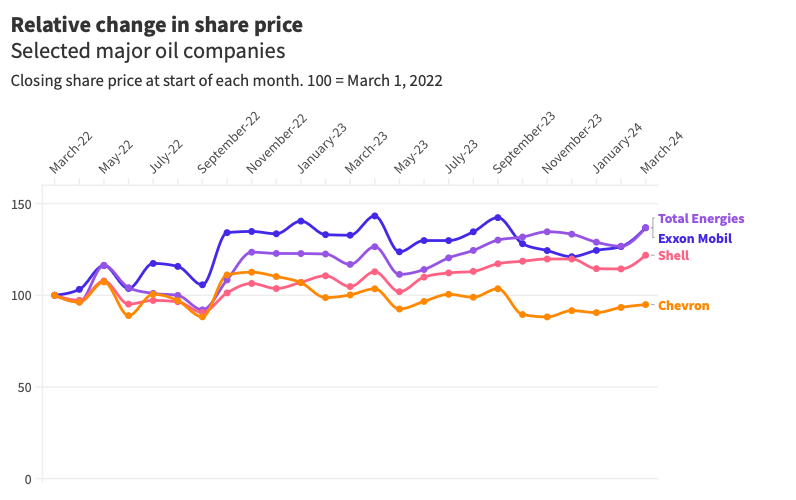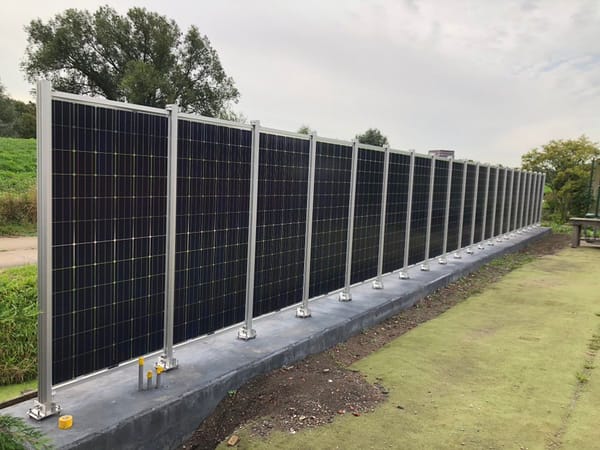Are markets shifting against oil companies?

Within days of each other, we were offered two different views of the energy world. In Houston, fossil fuel company leaders gathered earlier this week at the energy conference CERAWorld. There, Amin Nasser, president and CEO of Saudi Aramco, declared, “We should abandon the fantasy of phasing out oil and gas.”
Setting an opposing view, government leaders gathered yesterday for the annual Copenhagen climate ministerial, where UN Climate Change Executive Secretary Simon Stiell told ministers, “If we halve greenhouse gas pollution by 2030, while tripling renewable energy and doubling energy efficiency, we will also help free countries from the vagaries [of] volatile fossil fuels prices.”
By all accounts, oil companies are doing gangbusters business. In the last year they have experienced record profits, are producing more energy than ever before and have been paying supersized dividends to shareholders.

And yet, oil company share prices have been largely flat over the last two years. Exactly why, is a mystery, although some analysts believe the market is pricing in a future shift away from oil prices. In other words, investors seem to believe Mr. Stiell’s view more than Mr. Nasser’s.
Knowing that oil executive compensation is linked to share price, calls for increased oil sales in an era of flat share prices begin to take on a different hue. Adding fuel to the fire: The Economist last week produced a lengthy analysis of what could happen as oil phases out. In short: It won’t happen quick, the richest oil countries are already shifting their investments, but the smaller, less stable petrostates could become even less stable.
Oil companies will be paying out hefty dividends for some time. But their share prices could be stuck in neutral for good – which could become one of the most powerful forces for greening the economy.
A note: I will be vacationing with my family next week, so Heat Rising will be on hiatus until April 2. See you then!
Like what you see? Please forward to a colleague.
Ideas
The US EPA released new rules for vehicle tailpipe emissions that will effectively require all new cars and light-duty vehicles to be EVs by 2032. The rules, which step-up annually beginning 2027, require manufacturers to ensure vehicles produce fewer GHGs and other emissions each model year. The final rules allow plug-in hybrids in earlier years, a Biden Administration concession to car manufacturer concerns that EVs are not taking off as quick as previously anticipated. In past years car companies opposed new emissions standards. Now their lobbyists are on board, and it’s oil companies that are opposing the standards. [EPA fact sheet]
A report from SwissRe projects Filipino GDP will be damaged by 3% annually, about US$12 billion, in the foreseeable future due to climate-fueled natural disasters. The U.S. will suffer higher total damage amounts, predicts SwissRe, at 0.38% of GDP annually, about $104 billion of damage in 2024. Both the US and Philippines have higher exposure to hurricanes than most countries, the biggest drivers of natural disaster-related damage.
Mexico’s leading presidential candidate, Claudia Sheinbaum, moderated hopes that she would be a climate warrior this week, when she detailed a national energy strategy centered on increasing oil production while also promoting renewables. Sheinbaum, a Ph.D. in energy engineering, has contributed to IPCC reports, and is currently mayor of Mexico City. Mexico is the only G20 country without a net-zero emissions target.
As pressure builds to find steady global revenue sources for climate finance, marine shipping taxes seem like a juicy target for COP29 talks. Hoping to stave the taxes off, shipping representatives are now suggesting that instead a tax be created to pay for sustainable shipping fuels.
Climate Politics News
New U.S. climate envoy urges Japan to set clear coal phase-down plan [Nikkei]
US-China advance work on curbing methane emissions, US deputy climate envoy says [Reuters]
The Zombies of the U.S. Tax Code: Why Fossil Fuels Subsidies Seem Impossible to Kill [New York Times]
Loss and Damage Fund: Delays leave countries waiting and wondering [African Arguments]
Important Upcoming Dates
Copenhagen Climate Ministerial – March 21-22
World Bank/ IMF Spring Meetings – Apr. 19-21 – Washington, D.C.
G7 Climate and Energy Ministerial – Apr. 28-30 – Torino, Italy
Article 6.4 Supervisory Body Meeting (carbon credits) – Apr. 29-May 2 – Bonn
India Elections – Apr. 19 to June 1, results on June 4
South Africa Elections – May 29
Mexico Elections - June 2
UNFCCC Sessional - June 3-13 – Bonn
EU Parliament Elections – June 6-9
Article 6.4 Supervisory Body Meeting – July 15-18 – Bonn
Article 6.4 Supervisory Body Meeting – Oct. 7-10 – Bonn
US Elections – Nov. 5
COP29 – Nov. 11-22 – Baku, Azerbaijan





